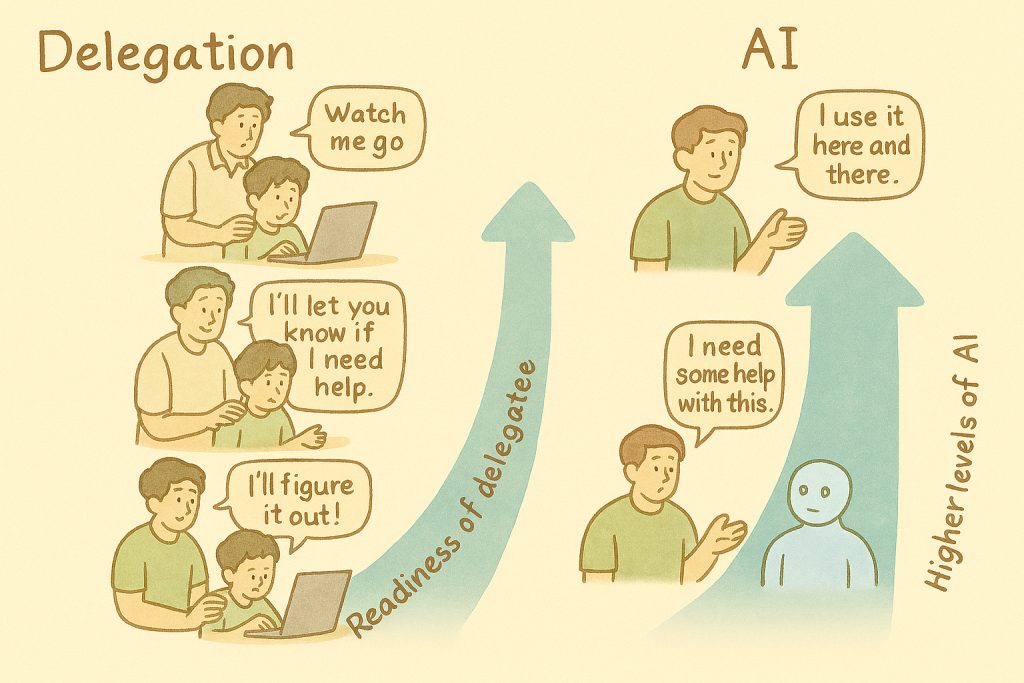Do You Just Have a Good Job or Are You Pursuing a Career? Three Crucial Questions for Knowledge Workers
Introduction
Are you actively building a meaningful career, or are you just coasting through a comfortable position in the quickly evolving world of work?
Consider this: You joined a corporation ten years ago with aspirations of moving up the corporate ladder. Looking around now, you see that the maze with its ever-shifting walls has taken the place of the ladder. How would you go about this unfamiliar terrain?
Based on my four decades of experience, I’ve reduced this complicated landscape to three key questions to help you traverse it. You can get clarity on whether you’re actively advancing your career or just keeping a steady employment by taking an honest look at your current circumstances.
First Question: Am I always picking up new abilities and skills?
Continuous learning is now required in the quickly changing work environment of today. It involves more than just picking up new abilities; it also entails cultivating a growth mentality and an unwavering quest for knowledge.
Let’s investigate this more. Are you actively looking for ways to broaden your range of abilities? Are you taking on new challenges by venturing outside of your comfort zone? Or are you depending on what you learned years ago?
Asking peers for guidance, solving problems, and completing duties on a daily basis are typically where real learning occurs. This hands-on learning environment is an excellent method to continuously learn new things. As an example, you could learn by:
· Solving a challenging technological problem that called for the investigation of novel techniques and methods. This might have required picking up a new library, framework, or programming language.
· Working on a project that forced you to step outside of your comfort zone and pick up new abilities while collaborating with a cross-functional team. For instance, you might have collaborated with designers on a user interface project, learning about design principles and best practices in the process.
· Participating in an internal session concerning a novel market trend and utilizing the acquired knowledge for your current role. This demonstrates your initiative and commitment to staying ahead of
the curve.
The frequency of your learning matters. To gauge your progress, consider this:
Years of Experience | Frequency Check | Self-Assessment |
1-2 | Weekly | Am I actively seeking |
3-5 | Bi-weekly | Am I actively seeking new learning opportunities |
6-10 | Monthly | Am I keeping my skills |
10-18 | Quarterly | Am I future-proofing my career by |
Beyond 18 | Bi-annual | Am I staying curious and |
Remember: It’s not about perfection but consistent progress. This is an honest self-assessment. Don’t be swayed by external validation.
Let’s Analyze a Situation:
Imagine you’ve just completed your first quarter at a new company. They recognize your potential and award you “best newbie” for excelling in a deep learning program (remember your college days with PyTorch?). This is a good start! Answering “yes” to the learning question indicates you’re on the right track to building a career.
However, what if some weeks you rely solely on your past knowledge and don’t actively learn anything new? If your answer to “am I picking up new skills or abilities?” is “no” for three consecutive instances within the timeframe mentioned above, this could be a red flag. It’s time to reassess your learning strategy. Perhaps you could:
· Seek out new challenges or projects that require you to learn new skills.
· Talk to your manager about your professional development goals and ask for her/ his guidance.
Second Question: Will My Skills Be Useful in the Future?
Acquiring new abilities is vital,
but it’s also critical to think about how useful they will be in the future. Do
you spend your time and effort developing abilities that will be in demand in
the future? Here’s where having foresight becomes crucial.
Use the same frequency check as in the
First Question to assess your state.
To evaluate your
abilities’ potential future worth, take into account the following:
- Sector Trends: Do you keep up with the most
recent changes in your sector and in technology? (For instance, going to
conferences, reading trade journals, and networking with colleagues) - Demand for Your expertise: Is there a strong market for
your expertise, or is it getting crowded out? - Transferable abilities: Can you use your abilities in
different sectors or roles? (For instance, carrying out a skills analysis,
seeking feedback from mentors or colleagues).
Let’s Examine a Situation:
Let’s say that you have worked for a corporation for four and a half years.
Your family is proud of you, you’ve gotten promotions, and pleased clientele
talk highly about you. All of them are encouraging indicators! However, what
about the times ahead?
You’re probably laying a solid professional foundation if you’ve regularly
responded “yes” when asked if you think your work will still be
relevant in the future. On the other hand, a series of “no” responses
(using the frequency check table) indicates that you may be concentrating on
abilities that are becoming less valuable. Are you refining more of a skill
that will become outdated soon? Is your job going to require significantly less
effort in the near future due to new technology? You may be at a disadvantage
if you don’t put any effort into learning new technology or acquiring
transferable abilities.
This illustration shows how crucial it is to foresee changes in the market
and keep improving your skill set in order to stay competitive.
Remember: Soft skills like problem-solving, communication, and flexibility are just
as important for long-term success as hard talents.
Question 3: Am I Operating in the Same Environment?
While stability is important, staying in the same environment for too
long can hinder career growth. This question has two aspects:
- Working with
the same manager: While a good manager can be a
valuable asset, staying with them forever might limit your exposure to
diverse leadership styles and project types. - Working in the
same team, technology, and domain: Deep expertise is valuable, but
staying too confined can make it difficult to adapt to changing industry
landscapes.
The Frequency Check:
- Years 1-10: Annual
self-assessment is crucial. Are you gaining well-rounded experience? - Beyond 10
years: Consider bi-annual reflection. Are you staying challenged and
exposed to new ideas?
Let’s Analyze a Situation (or two):
Imagine you’ve been working with a supportive manager for five years.
They’ve advocated for you, even taking you along when they switched teams. This
is a great sign of a strong working relationship. However, are you limiting
yourself by not experiencing other leadership styles and project types?
In another scenario, you’ve been with the same team and technology for
four years. Your colleagues respect your deep knowledge, but are you missing
out on opportunities to learn new skills and approaches by staying too
comfortable?
In both situations, even though you’re highly respected, a string of
“no” answers based on the timeframe suggests a potential stagnation
in your environment.
Finding the Balance
There’s a balance to be struck between frequent job hopping and staying
in the same environment for too long. Here are some specific examples of how
you can seek new projects or internal transfers within your company:
- New Projects: Look for
opportunities to collaborate with different teams or departments. This can
expose you to new skills and leadership styles. - Internal
Transfers: Check if your company offer internal transfer programs. This can be
a way to gain experience in a new area while staying with the same
employer. - Professional
Development: Actively network within your industry and attend conferences. This
can keep you updated on industry trends and connect you with potential
mentors or employers.
Remember: The goal is to find the right balance between stability and growth.
Call to Action
Personally, with generative AI being the rage today, I am exploring how
it can impact my future. Could I use it to supplement my capability, or is it
“Game, Set, and Match –Generative AI.”?
For instance, I created this post using traditional methods, then
improved it using AI tools like Gemini, ChatGPT and QuillBot for restructuring
and visual guidance. I have spent significantly more time than I would when I
write a post. However, I have started to learn how to work in the new AI world through
this process. For now, this process
has helped me embrace AI as a valuable assistant, enhancing my work while
maintaining the essence of my natural intelligence.
Also, I have a higher sense of satisfaction about the final product that
I have created. I would love to hear your comments, critique on this post.
So where are you on your journey? What are you doing? If you are already
doing this, would love to hear about your experience –the challenges and how
you handled it. If you have a question about your situation, why not post it as
a response? You can get potential pointers to move on.
What’s your career story? Share your experiences, challenges,
and triumphs in the comments section below. Let’s inspire and learn from each
other.
Conclusion
Remember, the goal is to actively build a fulfilling career, not just
hold a comfortable job. By asking yourself these three key questions regularly,
you can ensure you’re actively building a fulfilling career, not just a
comfortable job. Remember, honest self-assessment is key. By continuously
learning, future-proofing your skills, and adapting to new environments, you
can ensure long-term success and satisfaction in your professional journey.
Keep pushing your boundaries, stay curious, and embrace change.
In the future, I intend to explore how to handle the
challenges with the above 3 questions.




